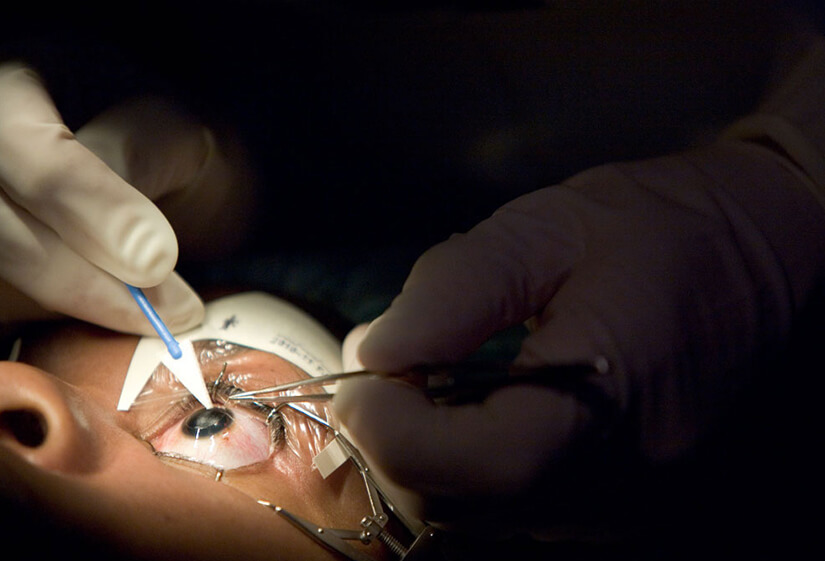Types of Lenses for Cataract Surgery
Cataract surgery is now one of the safest, most effective, and most commonly performed procedures globally, restoring clear vision for millions of patients each year. Thanks to advancements in technology, patients now have a wide range of intraocular lenses (IOLs) to choose from, allowing them to regain clear vision after surgery. Choosing the right lens can significantly impact your visual outcome and quality of life. In this article, we’ll explore the various types of lenses available for cataract surgery, their benefits, and how to decide which one is best for you.
Introduction to Cataract Surgery and Intraocular Lenses (IOLs)
What is Cataract Surgery?
Cataract surgery is a procedure where the cloudy natural lens of the eye is removed and replaced with an artificial intraocular lens (IOL). This surgery, typically performed on an outpatient basis, helps restore clear vision and can significantly reduce or eliminate the need for glasses in many cases.

Importance of Intraocular Lenses (IOLs)
IOLs play a crucial role in the success of cataract surgery. They not only restore vision but can also correct refractive errors like nearsightedness, farsightedness, and astigmatism.
Monofocal Lenses of Cataract Surgery
Overview of Monofocal Lenses
Monofocal lenses are the most commonly used type of intraocular lens (IOL) in cataract surgery, providing clear vision focused at a single distance.
Benefits of Monofocal Lenses
- Affordable and widely available
- Excellent distance vision clarity
- Proven long-term success rates
Limitations of Monofocal Lenses
- Does not correct presbyopia (age-related near vision loss)
- Patients may need reading glasses for close-up work
Multifocal Lenses
What are Multifocal Lenses?
Multifocal lenses provide multiple focal points, allowing patients to see clearly at different distances – near, intermediate, and far.
Advantages of Multifocal Lenses
- Reduces dependence on glasses for most activities
- Provides good vision across various distances
Who is a Candidate for Multifocal Lenses?
Ideal for individuals who want to minimize glasses use and are comfortable adapting to some glare or halos at night.
Toric Lenses
Understanding Toric Lenses
Toric lenses are specially designed to correct astigmatism, a condition caused by an irregularly shaped cornea.
How Toric Lenses Correct Astigmatism
By aligning with the cornea’s irregular shape, toric lenses provide clearer and sharper vision.
Benefits and Drawbacks of Toric Lenses
- Significant astigmatism correction
- Slightly higher cost than standard IOLs

Extended Depth of Focus (EDOF) Lenses
What Makes EDOF Lenses Unique?
EDOF lenses create a single elongated focal point, improving intermediate and distance vision without compromising quality.
Conclusion
Choosing the right intraocular lens (IOL) for cataract surgery is crucial for achieving the best possible vision outcome. With options like monofocal, multifocal, toric, EDOF, accommodative, and light-adjustable lenses, each type offers unique benefits tailored to different vision needs and lifestyle preferences. It’s important to work closely with your ophthalmologist to assess your vision goals, lifestyle, and any underlying eye conditions to make an informed decision. While premium lenses may come with a higher cost, they can provide significant advantages in terms of visual freedom and quality of life. Ultimately, with the right lens, you can look forward to a clearer, brighter future free from cataracts.
Author Details:
Dr. Sushruth Appajigowda holds a prominent position as a Cornea, Cataract, Glaucoma, and LASIK Surgeon in Bangalore. He serves as the chief Cataract and Refractive surgeon at Vijaya Nethralaya Eye Hospital, Nagarbhavi Bangalore. Renowned as one of the finest LASIK surgeons nationwide, he brings with him over 12+ years of experience across multiple LASIK platforms, including ZEISS, ALCON, SCHWIND, AMO, and Bausch and Lomb. Having successfully conducted over 5000 LASIK procedures, Dr. Sushruth holds the title of a Certified Refractive Surgeon and a Fellow of the All India Collegium Of Ophthalmology. Furthermore, he stands as a distinguished speaker at various National and International Forums, using his expertise to guide you in selecting the most suitable procedure based on your health requirements.

http://vijayanethralaya.com/link-in-bio/
FAQs
How long do cataract lenses last?
Cataract lenses are designed to be permanent, and most IOLs last a lifetime without requiring replacement.
Can I upgrade my IOL after surgery?
In some cases, it may be possible to exchange your IOL after surgery, but it’s essential to discuss this option with your surgeon based on your needs and the type of lens you have.
Which lens is best for night vision?
EDOF lenses are often the best choice for patients who want to improve their vision at night, as they provide a smoother transition between different focal points and reduce glare.
Are premium lenses worth the extra cost?
If you want to reduce dependence on glasses and achieve optimal vision at multiple distances, premium lenses like multifocal or EDOF lenses are worth considering for the added convenience and quality.
How do I know which lens is right for me?
Consulting with your ophthalmologist is the best way to determine which IOL is most suitable for your needs, considering factors such as your vision goals, lifestyle, and any pre-existing eye conditions.












